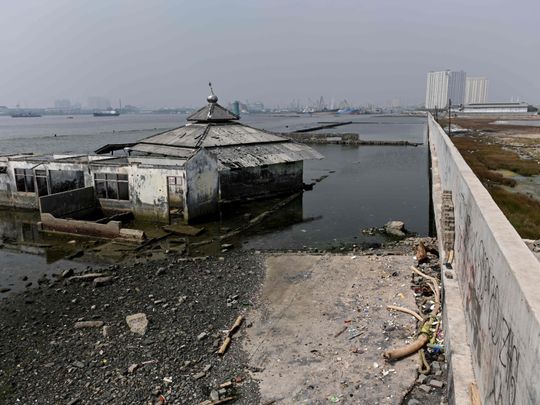
Indonesia’s president wants to spend at least $30 billion to move the capital to a forest on the island of Borneo.
The proximate trigger is climate change — Jakarta is sinking into the sea. President Joko Widodo is planning a giant wall to keep big waves out, but global warming presents a clear danger to low-lying cities. After analysing 393 cyclone-vulnerable coastal cities in 31 countries, World Bank economists have concluded that 40 per cent of the damage from storm-surge catastrophes would fall on three Asian cities — Jakarta, Manila and Karachi, Pakistan. The Philippines is shifting government offices from coastal Manila to higher ground: the old American airbase of Clark City. No wonder Widodo wants to move to the province of Kalimantan in Borneo, an island Indonesia shares with Malaysia and Brunei. The private sector and financial centre will remain in metropolitan Jakarta, a megalopolis teeming with 30 million people. Yet in practice, the relocation will be a big prize for the private sector, with everything from real-estate development, urban gas supply, hospital management and many others up for grabs. The move is planned to start around 2024.
What kind of capital will the nation of 267 million people get? A Naypyidaw, the nearly empty new city in central Myanmar conceived by a military junta? Or something more like Brasilia, which Brazil carved out of the Amazon in the 1960s to lessen the overarching role that Rio de Janeiro had played since Portuguese colonial times?
Widodo will be hoping for a Brasilia and to shake up the primacy of Java, the main island of the more than 18,000 that make up Indonesia. The move could also tilt the economic growth model away from state-owned enterprises, which are playing a bigger role since the president, known as Jokowi, came to office in 2014 and pledged to develop infrastructure in far-flung parts of the country.
Mistrust of private enterprise
Indonesia has a historic mistrust of private enterprise. The resource-rich archipelago was plundered by foreign concessionaires and their cronies under former President Suharto’s 32-year dictatorship, which collapsed in the 1998 Asian crisis. Since then, Indonesia has been maturing as a democracy and stars like the ride-hailing app Gojek are the face of a youthful new private sector. A $30 billion new city project can be a playground for creativity — or a den of corruption. Indonesia has to choose wisely.
A similar choice exists for the environment. The annual haze that engulfs Singapore and Malaysia emanates in part from forest fires in Kalimantan as farmers clear land for plantations. Will having the president in the neighbourhood improve the policing of oil-palm estates? If the foul air quality in the Indian capital of New Delhi because of paddy-stubble burning in Punjab is any guide, the answer isn’t obvious. But if Jokowi does succeed, it will be a PR coup — European ambassadors’ children living in Kalimantan could persuade their home countries to stop objecting to the use of Indonesian palm oil in biofuel. That would safeguard the livelihood of 6 per cent of Indonesians.
If the idea is to reduce the entrenched homogeneity of majority Malay-Muslim Javanese power and diversify across the ethnic, cultural and religious mix that makes up 'Indonesian flavour,' then the effort is praiseworthy.
The history of planned, new capital cities is mixed. The broad boulevards of Naypyidaw still await that one ingredient without which no city is complete: people. But there are successes. Why shouldn’t moving the seat of political power give Indonesia its own Canberra? The century-old, low-profile Australian capital is home to 400,000 residents. How hard can it be to fill a new urban agglomeration with 1.5 million inhabitants, asks Bambang Brodjonegoro, the minister of national development planning. Indonesia has 11 times as many people as Australia.
Then there’s Brasilia. As Portugal did with Rio, the Dutch East India Company made Batavia — modern-day Jakarta — the epicentre of a vast trading network. And just as post-colonial Brazil felt the need to weaken Rio’s centrality, Jokowi has tasked Brodjonegoro to reduce the political role of Java, the most-populous island and a 59 per cent contributor to annual GDP. Dated as Brasilia’s pioneering modernist look might seem now, the city helped change Brazil for the better. “Jakarta is in Java,” the minister tells me. “It reflects the Javanese identity.” But Indonesia is meant to be more than Java. If the idea is to reduce the entrenched homogeneity of majority Malay-Muslim Javanese power and diversify across the ethnic, cultural and religious mix that makes up “Indonesian flavour,’’ as Brodjonegoro describes it, then the effort is praiseworthy.
There’s no escaping the prevailing global zeitgeist of majoritarianism. By today’s standards, just wanting to lean against it makes Jokowi a very different kind of leader.
— Bloomberg
Andy Mukherjee is a Bloomberg Opinion columnist









